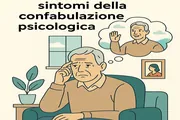

Precisely because of a completely pathological mechanism, people who are gradually confronted with the evidence that they're telling fantastic, invented stories, with no basis in reality, are completely surprised when they realize this. Their surprise is so pronounced that they tend to invent new stories that essentially attempt to justify and provide a deeper meaning to what happened to them and why it happened.
These are people who, in principle, don't recognize they have a problem. They are completely unconvinced that they have cognitive deficits, and for this reason, they tend to believe they have no such problem. Precisely because of this level of personal persuasion, the disorder worsens. They will therefore tend to increase their level of fantastical production of stories that have no basis in reality.
This fundamental inability translates into a sequence of memories that are out of chronological order. If the patient responds to an external stimulus, perhaps a specific question, the problem may be linked to a deficient memory process.
Recent studies have highlighted how people who spontaneously tend to construct a story, a tale, or an anecdote about their lives that has entirely illusory and fictitious characteristics exhibit a fundamental inability: the inability to clearly and coherently recognize the order of the information they must memorize.
These elements are just part of the complexity of psychological confabulation. To learn more about diagnosis, clinical research, and therapeutic strategies, keep reading or explore related articles.
But what really happens inside the brain of someone who confabulates?
Then there are patients who may even adopt behaviors that are completely consistent with the stories they have told, thus demonstrating that they are completely in good faith and firmly believe the stories they tell, and that they have great faith in these completely invented memories.
Then there are cases in which this type of creative approach adopted by a person suffering from this disorder is not the result of a direct question posed by another interlocutor, but is instead a mechanism that arises spontaneously in their mind and leads them to construct a fantastical tale.
In some cases, it has been observed that this approach adopted by a person suffering from this disorder may be the result of an external stimulus. Perhaps they are asked a specific question, and they respond by creating a story from scratch that has no connection to reality.
The story as such lends itself to analysis and skepticism from those who listen to it.
The content is not coherent enough to make what is being told credible;
First, the fact that the story is clearly out of place with the context in which it is set stands out;
Let's see what elements indicate that we are dealing with a completely fabricated story:
How is it possible for the person listening to this story, full of fantasy and invention, to understand that it is completely invented? There are a series of elements that, as such, allow those who listen attentively to the story to understand that it is a completely fictional and invented tale that has nothing to do with everyday reality.
They could be stories that actually happened to the subject but are temporally dislocated from this present. In practice, the subject would be unaware that the story they are telling, the experience, is actually set in a different time period.
They could be completely fictional stories that have no real connection whatsoever.
This approach could be the result of two different ways of distorting the actual content of a subject's experiences:
They are therefore completely unaware, they do not know they are telling a made-up story and they do not even have the intention of deliberately lying to the person to whom they are telling the story because they are completely in good faith.
In short, they are, in effect, driven by a good faith that makes them believe that what they are telling their interlocutor is not the fruit of pure invention but is actually a concrete event and, as such, connected to a real episode in their life.
So when they tell them, not only do they have no perception that they are actually inventing stories that have no connection to the real world they experience, they also have no perception that their story is invented or that they are lying to someone.
The interesting thing that emerges from this disorder is that the person affected by this problem has no perception that they are telling stories that are simply the product of their imagination and that have no concrete connection to reality.
In this article, we explore not only what confabulation is, but also the unconscious mechanisms, hidden signs, and deeper clinical implications. Some findings may surprise you.
These are people who have a specific characteristic: they tell anecdotes, memories, and stories that, at first glance, when related to an outside listener, might seem concrete and have a specific basis. However, upon closer inspection and a little analysis by the listener, they emerge for what they are: invented stories that have no bearing on the person's reality.
These are therefore false, invented stories and memories that have no bearing on the reality the person is experiencing. This is a problem that can affect specific types of patients, perhaps those who have suffered damage to the frontal area. What is the specific characteristic of these patients?
If you've never heard of confabulation, know that it's usually a sign that the individual may have specific pathologies. These lead the individual to construct a world of memories related to their experiences that have no real basis.

To explore related topics, read our article on post-traumatic stress disorder .
More information can be found on the Wikipedia page on confabulation .
It is a condition in which a person recounts false or invented memories, believing them to be true. Often linked to memory disorders or frontal lobe damage.
The content lacks contextual coherence, appears disjointed or implausible, and often fails under attentive scrutiny.
It can result from traumatic brain injury, memory processing deficits, or conditions such as Korsakoff's syndrome.
No. The person is unaware that the story is fabricated and genuinely believes in what they are saying.
Treatment depends on the underlying cause and may involve cognitive rehabilitation or neuropsychological therapy.
Yes. In both conditions, the mind may distort memories. PTSD often involves traumatic real events, whereas confabulation can fabricate them entirely.
← Read also: Masochism – psychological features and implications